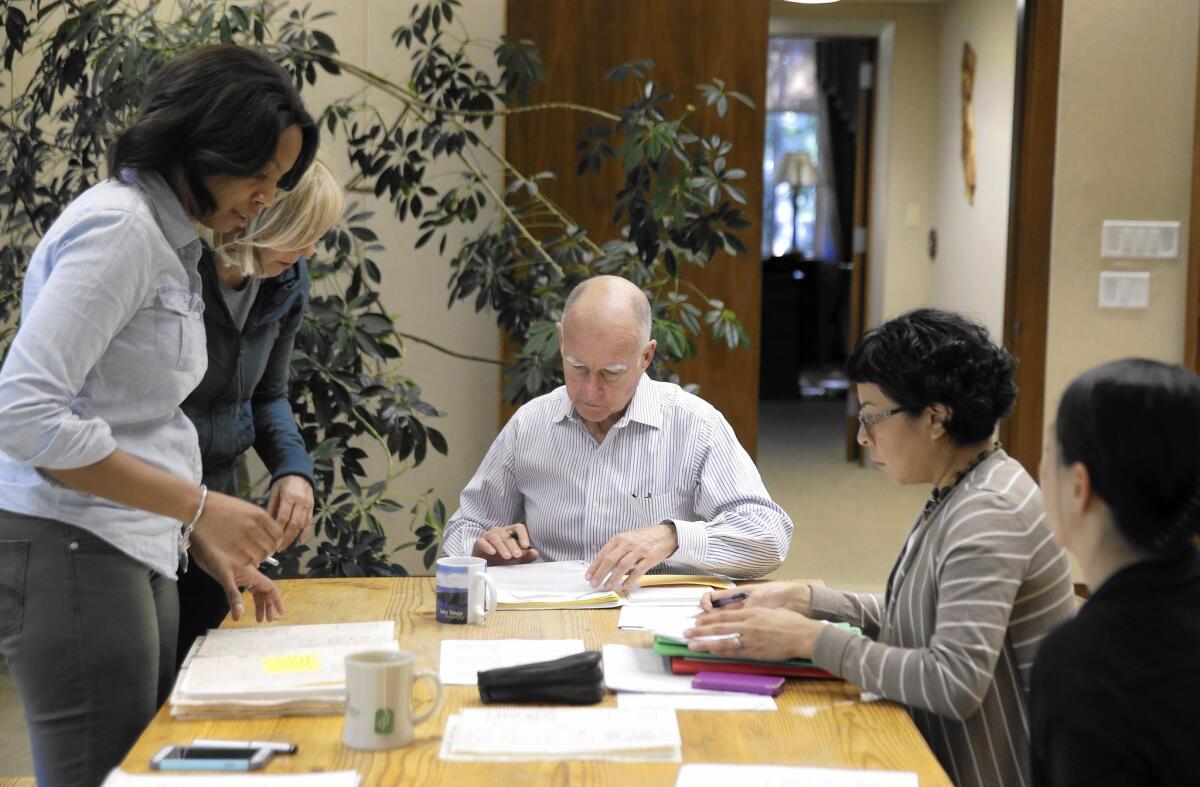Brown vetoes tax credit that would have eased seismic retrofitting costs

California Gov. Jerry Brown, accompanied by staff members, has a Sunday deadline to deal with the remaining bills passed by lawmakers in the final days of this year’s legislative session.
- Share via
Delivering a blow to Mayor Eric Garcetti’s plan to improve seismic safety throughout Los Angeles, Gov. Jerry Brown on Saturday vetoed legislation offering tax credits for property owners seeking to bolster structures at risk of collapsing in a big earthquake.
Los Angeles on Friday enacted the nation’s most sweeping seismic regulations, requiring that an estimated 15,000 concrete buildings and wooden structures with weak first floors be retrofitted so that they could better withstand violent shaking. Garcetti and others had viewed tax credits as a possible way of easing the financial burden.
Brown said the state’s finances remained too precarious to expand such credits.
“Given [the] financial uncertainties, I cannot support providing additional tax credits that will make balancing the state’s budget even more difficult,” he said in a statement about his veto of this and other bills that would have created new credits or expanded existing ones.
Garcetti expressed disappointment with the veto but vowed to push to find ways to reduce the financial load of seismic retrofitting on building owners and tenants.
“Every dollar we invest today saves lives and property when the next big one hits,” Garcetti said in a brief statement.
Under the new Los Angeles law, which the City Council passed unanimously, property owners will have seven years to fix wooden apartments and 25 years to repair concrete buildings. The city has already identified about 13,500 apartment complexes that officials suspect need retrofitting. A Times investigation in 2013 found more than 1,000 older concrete structures — including landmark buildings in downtown, Hollywood and Westwood — that require close scrutiny.
Owners will be required to find a way to pay for the work, which can range from $60,000 to $130,000 for wood apartments and millions of dollars for large concrete towers.
The city’s housing department has suggested that renters and owners evenly split the cost of repairs, with owners allowed to charge a monthly maximum surcharge of $38 to pay for the retrofitting.
The bill that Brown vetoed would have used tax credits to offset 30% of the cost of seismic improvements. City officials in San Francisco also have made the retrofitting of vulnerable buildings a high priority.
“I’m disappointed,” said Assemblyman Adrin Nazarian, the Sherman Oaks Democrat who had proposed the bill. “Often I agree with the governor on fiscal issues; however, California is on borrowed time. An earthquake will strike, and the cost we pay for preventable damage will far exceed this modest tax credit.”
Nazarian said his goal had been “to at least start something, to start with one step, and then … when we saw it was really helping out our constituents, to grow it over time.”
He added that he looked forward to working with Brown to ensure that California “prioritizes seismic retrofitting in next year’s budget.”
Twitter: @MarthaGroves
More to Read
Sign up for Essential California
The most important California stories and recommendations in your inbox every morning.
You may occasionally receive promotional content from the Los Angeles Times.











